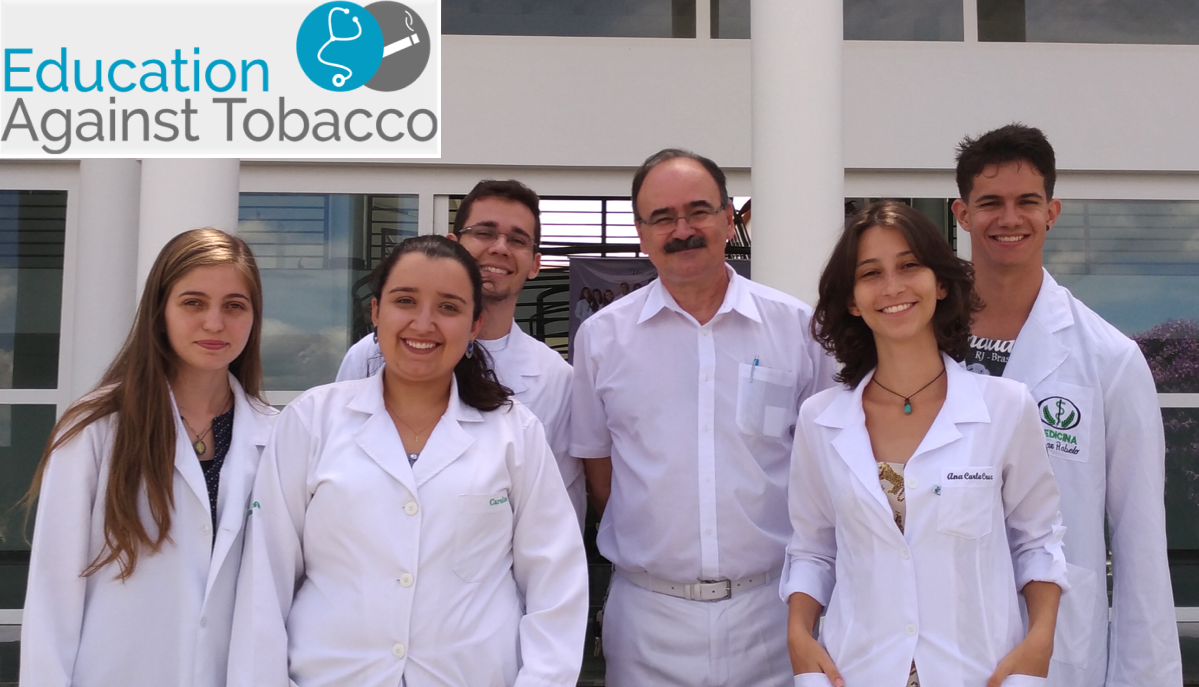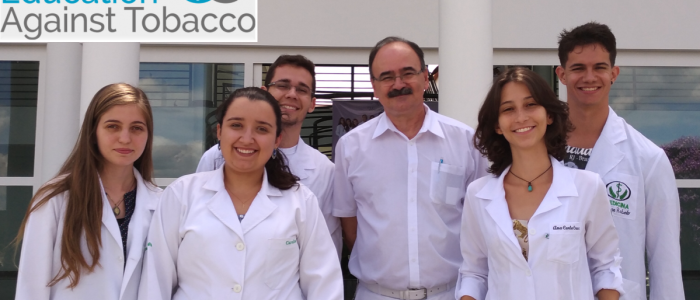New group founded in Brazil by medical students from University of Itaúna (UIT)

From left to right: students Bianca Lisa, Carol Mendonça and Ricardo Miranda, Prof. Dr. Olber Faria (supportive faculty), students Ana Oliveira and César Rabelo. School of Medicine at University of Itaúna (UIT), Brazil.
EAT has just been launched at University of Itaúna (UIT), which now becomes the third University in Brazil to integrate the EAT network. The group, led by Bianca Lisa – a 3rd year medical student, is excited with the potential that EAT has to contribute to tobacco control as in a recent study they found a very high prevalence of smoking experimentation in adolescents from local secondary public schools.
Bianca, what motivated you to found EAT at UIT?
I believe that as medical students and future physicians, we must fight against tobacco to promote health and prevent diseases. Smoking is the leading preventable cause of death in the world and current trends show that tobacco use will cause more than 8 million deaths annually by 2030. In this scenario, EAT motivates me not only because it is a project of which strategies have been scientifically proven to be effective, but also because it sensitizes me and other medical students for our responsibilities within communities. In addition, as a member of the UIT Pulmonology Interest Group, I engaged in a research to identify the prevalence and associated factors related to tobacco experimentation among students of public high schools in Itaúna. The preliminary results showed us the need of a school-based tobacco prevention program in the city and then EAT has emerged as an extraordinary opportunity.
Tell us a bit about the activities of the UIT Pulmonology Interest Group.
Ricardo Henrique Silva Miranda, 4th year medical student: “The Pulmonology Interest Group at UIT was founded in March 2016. Our members meet once a week to discuss clinical cases and pulmonology issues. Our group held in September 2016 the ‘1st Cardiopulmonary Health Journey’, a symposium in partnership with the Cardiology Interest Group. We also have organized workshops and practical activities on pulmonology and promoted research projects and poster presentations by UIT scholars.”
Could you comment on the tobacco study coordinated by UIT Pulmonology Interest Group and how it may relate to EAT?
Prof. Dr. Olber Faria (MD, Pulmonologist): “In the current Brazilian scenario, a considerable number of students have already smoked cigarettes and there is an increasing propagation of use of others tobacco products in this age group, so the UIT Pulmonology Interest Group has proposed a research to elucidate the main factors related to tobacco products use among adolescents in the city of our University. When I first heard about EAT and its positive results in tobacco control, I got excited about the possibility of starting the project in Itaúna. Considering that EAT is a plan seeking to prevent and combat tobacco use among teenagers, I believe EAT and the research of UIT Pulmonology Interest Group have complementary objectives, and both of them will benefit from this partnership.”
What are the next steps to effectively start the EAT project at UIT?
Carol Mendonça, 4th year medical student “The first step for the effective implementation of EAT at UIT is the recruitment of more medical students, who will assist us in the interventions of the project. The recruitment procedures will include personal interview and analysis of issues as proactivity and compatibility with the project. After this process, the project will be extensively explained to the selected members. Afterwards, a pulmonologist will give a lecture about smoking. In this lecture, it will be elucidated, with more details, doubts about interventions and the project. Then, a public health specialist will give a lecture on health education. Finally, the members will be ready to plan their interventions and they will present their interventions to the board of directors to obtain consent. After approval, they will start to implement their interventions in public schools.”
More information: https://educationtobacco.org/brazil-uit

